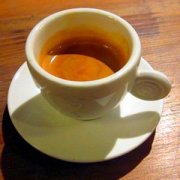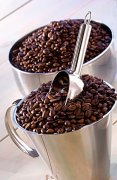The basic knowledge of coffee tasting
Tasting coffee, we should not only pay attention to the appropriate temperature, but also have the appropriate amount. Drinking coffee is not like drinking or juice, a full cup of coffee, watching it will lose interest in drinking. Generally speaking, they are only in the right amount when they are full of seven or eight minutes. Moderate amounts of coffee will not only stimulate the taste, but will not feel "greasy" after drinking it. On the contrary, it will have an endless aftertaste. At the same time, the right amount of coffee can moderately promote the body to recover from fatigue and refresh the mind. There are different flavors of coffee, so you can't drink three or four cups in a row like tea or cola, but the formal coffee cup is the best.
Ordinary coffee to 80-100cc for the right amount, sometimes if you want to drink three or four cups in a row, then it is necessary to dilute the concentration of coffee, or add a lot of milk, but still take into account the degree of physical needs, to add or reduce the concentration of coffee, that is, do not cause greasy or nauseous feeling, and in the mix of sugar might as well be more changes to make the coffee more delicious. It also depends on the condition of the body when drinking coffee, the surrounding atmosphere and so on. If you drink coffee in a near coffee shop, you will sometimes drink almost half-cold coffee. No matter how good the coffee beans are and how good the brewing skills are, you will lose your appetite for coffee.
Drinking while it is hot is a necessary condition for tasting coffee, even on a hot summer day. When the coffee is cold, the flavor will decrease, so when brewing the coffee, in order not to reduce the taste of the coffee, soak the coffee cup in boiling water in advance. The appropriate temperature for coffee is 83 degrees Celsius at the moment of brewing, 80 degrees Celsius when pouring into the cup, and 61-62 degrees into the mouth, which is the most ideal.
People who are used to drinking coffee do not necessarily taste coffee. To taste coffee is not only to feel it with the taste of the tongue, but also to enjoy the mellow taste in the mouth. Tasting coffee is a very wonderful thing. Only by tasting coffee in the right way and method can you taste high-quality coffee.

Important Notice :
前街咖啡 FrontStreet Coffee has moved to new addredd:
FrontStreet Coffee Address: 315,Donghua East Road,GuangZhou
Tel:020 38364473
- Prev

The basics of coffee teach you how to make coffee.
The first thing to introduce is not to brew the coffee, but to make it. There are several key points to pay attention to when making coffee at home: 1. Different coffee powder practices are different. You can usually ask the shop assistant who buys the coffee. two。 When the water temperature is 92 ℃-96 ℃, it is suitable to use a small household coffee machine, coffee should pass through filter paper or filter, generally speaking, 175ml coffee can be made with 10g coffee powder. That's for sure,
- Next

Coffee common sense quality coffee from all over the world
The United States is the country that consumes the most high-quality coffee in the world, especially American-style high-quality coffee brewed from lightly roasted high-quality coffee beans. In fact, there are a variety of high-quality coffee drinks depending on region or race. American quality coffee is often drunk on the west coast, while strong European-style coffee is preferred in the east. Black tea is still popular in Britain.
Related
- Beginners will see the "Coffee pull flower" guide!
- What is the difference between ice blog purified milk and ordinary milk coffee?
- Why is the Philippines the largest producer of crops in Liberia?
- For coffee extraction, should the fine powder be retained?
- How does extracted espresso fill pressed powder? How much strength does it take to press the powder?
- How to make jasmine cold extract coffee? Is the jasmine + latte good?
- Will this little toy really make the coffee taste better? How does Lily Drip affect coffee extraction?
- Will the action of slapping the filter cup also affect coffee extraction?
- What's the difference between powder-to-water ratio and powder-to-liquid ratio?
- What is the Ethiopian local species? What does it have to do with Heirloom native species?

